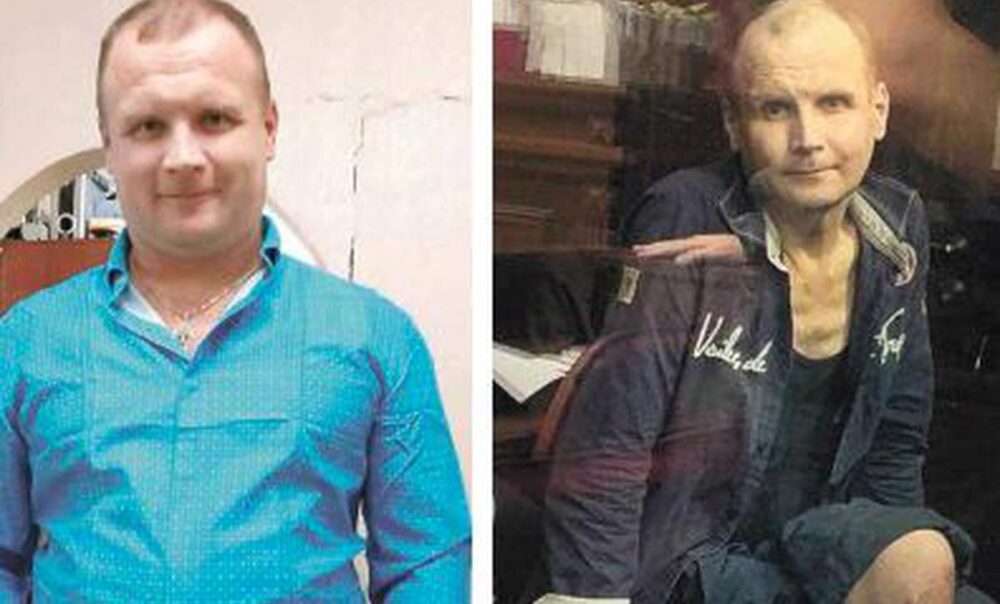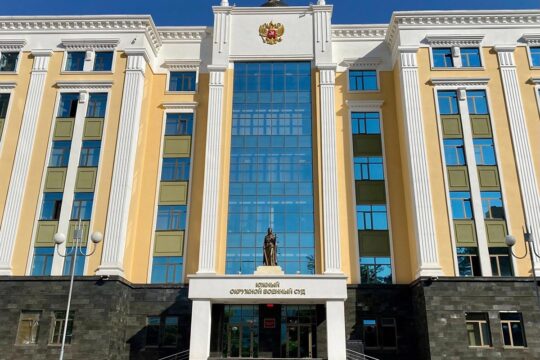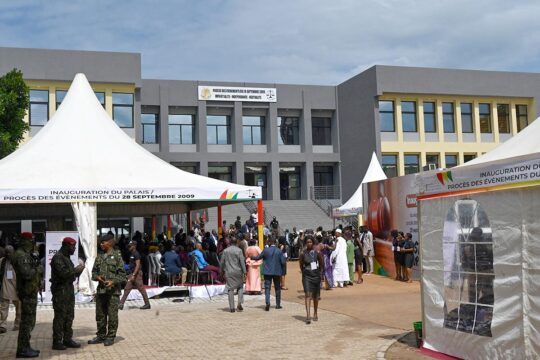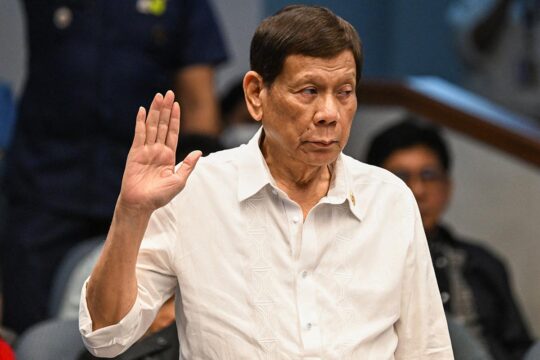In western Russia, the Northern District Military Court of Rostov-on-Don is about to conclude the trial of 22 Ukrainian prisoners of war, alleged members of the “Azov” regiment, some of whom have been exchanged apparently without the court’s knowledge. They are accused of being members of a terrorist organization and of “forcible seizure of power”. “Azov” is from November 2014 an official military formation of the National Guard of Ukraine. However, the Supreme Court of Russia declared “Azov” a terrorist organization in August 2022.
Two of our Chernihiv region residents are among the accused – 45-year-old Oleksandr Irkha from Novgorod-Siverskyi and 44-year-old Oleg Myzhgorodskyi from Horodnia. The prosecutor requested 21 years in prison for Irkha and 22 years for Myzhgorodskyi. Irkha served as a mechanic and driver in “Azov” from 2015 to 2020. Then he worked at a metal warehouse. He lived in Mariupol. In April 2022, the city was occupied. Oleksandr was taken by the Russian military for filtration [Russians set up “filtration camps” where captured Ukrainians, military and civilian, go through a “verification” process - tattoos, telephones, papers, etc.]. Then, he was incarcerated.
“We are in hell, finishing carrots and beetroots”
At the time of his capture, Myzhgorodskyi was a civilian as well. “Oleg used to live in Chernihiv. He was working, delivering different merchandise,” his 36-year-old sister Iryna Kyrychanska explains to Visnyk Ch. “In 2015, he fought during the ATO [Anti-Terrorist Operation, to regain the occupied Ukrainian territory of Donetsk and Luhansk]. In 2016, he signed a contract and served as a driver in the ‘Azov’ regiment. Later, he was responsible for supplies. He met his second wife in the Donetsk region. She had two sons. They wanted a girl. They decided to adopt one. When they found 12-year-old Natalka, it turned out that she had a five-year-old brother, Slavko. He has a disability, a kidney problem. They decided not to separate the children and adopted them both. And then Sasha was born, he is now four years old. On August 30, 2021, my brother’s contract ended,” she recounts.
“Their family lived well, in a private house in Mariupol. On February 24, 2022 [when the Russian full-scale invasion started], I talked to my brother. He said: “I spoke to my military friends; they assured me that it would all be over in ten days, and everything will be alright.” Then I spoke to Oleg again on March 14. “Ira, we are in hell. There is no food, no water, no electricity,” he said. “We are being shelled from everywhere. The house was hit directly. We are sitting in the basement, finishing carrots and beetroots.” Then she told him he had a new niece. “He was crying tears of joy,” Iryna recalls.
“Hello, your brother is in detention”
“On April 10, I received a message on my phone: ‘Hello, your brother Oleg Dmytrovych Myzhgorodskyi is in detention […], he is in Donetsk. Investigator’. The phone number was Russian. No matter how many times I called, no one would answer,” continues his sister.
“Later, I learned from my brother’s wife that they had relocated with their children from the basement to their friends’ house. On March 31, there was a purge on that street. The ‘DNR’ people [from Donetsk] came into the yard. They put a bag over Oleg’s head in front of the children and took him away. Someone turned him in. Locals had seen Oleg in a military uniform in the past. No one was interested in the fact that he had left the army seven months prior.”
“After a while, it was reported that he had been executed. His wife did not know what to do. My parents and I were desperate, so we went to the police. My mother kept calling the hotline of the National Information Bureau for Prisoners of War and Missing Persons. We contacted the Coordination Headquarters for the Treatment of Prisoners of War, the Red Cross, all organizations that could provide us with some kind of help. But we would get the same answer: ‘There is no evidence. Where are the videos, where are the photos?’”
“We searched for Oleg among the living and among the dead. During this time, the retired mother learned how to use the Internet and search for information on social media. Oleg’s daughter from his first marriage also joined the search. We even went to clairvoyants. They all agreed that he was alive, but he was in terrible shape, seriously ill.”
Gangrene, broken ribs, and a dislocated arm
“Suddenly, in August [2022], Oleg called his wife. At first, she did not recognize his voice. He told her he was in the Donetsk detention centre. Daily interrogations with torture - it’s horrible. He was all blue and yellow from bruises. He wasn’t feeling well,” Iryna Kyrychanska confides.
“Last year, on June 14, the so-called trial of the ‘Azov’ fighters began. On June 28, I came across a video from the courtroom on the Internet. The prisoners behind bars looked exhausted as if they had been brought from a concentration camp. I did not recognize my brother. I realised it was him when he introduced himself. Before the war, Oleg weighed 115 kilograms, he weighs only about 50 now. His leg was bandaged, he looked weak.
We managed to contact Oleg’s lawyer in Russia. He said that my brother had developed gangrene, had broken ribs and a dislocated arm. He was walking on crutches because his leg was in a very bad condition. He was taken away from the courtroom with a high fever. I made photos from that video.”
Red Cross: “We have no influence on the exchanges”
“We began reapplying to all the authorities. The Coordination Headquarters said: ‘The aggressor side does not provide confirmation’. Until there is a list from the other side with a stamp, he will not be granted the status of a prisoner of war. The Red Cross responded: ‘We have no influence on the exchanges. We cannot help with anything’,” adds Kyrychanska.
Through his lawyer, Oleg transmitted a tiny piece of paper where he wrote that he was holding on for the children, that he had survived for them. He also asked for a pocket Bible. The lawyer took a picture of the note and sent it to his wife. “My brother was reciting all the prayers our mother had taught him. Just imagine how hard it is for him there. It is not easy for our mother either – she can feel his suffering from afar. Sometimes she wakes up in the middle of the night because both her body and soul are in pain.”
“Only this March, Oleg’s status was changed from ‘missing’ to ‘captured’. They wrote: ‘civilian’ with a remark ‘former military’. The Coordination Headquarters said that my brother was now included in the exchange list.”
“His wife and children are still in Mariupol. She works two jobs as a cleaning lady. She sends him packages. Oleg’s condition has slightly improved compared to a year ago. The situation is no longer as horrible as in the Donetsk detention centre, where there were inhuman conditions and beatings. My brother was transferred to Rostov-on-Don. Initially to the 1st pre-trial detention centre, then to the 5th. These days, only the guards can hit him if he keeps lagging behind. And it is indeed hard for him to walk,” his sister says sadly.
“The court does not listen to Oleg. Perhaps something will change during the debates. On September 13, during the last exchange, nine women were returned to Ukraine, they were tried in the same case as Oleg. Almost two years ago, two men were returned. So, there is hope. We live with this hope and pray for Oleg’s rescue,” she says.
How can they be brought back?
“Considering the conditions they are held in, and after being tortured, people confess even to things they did not do,” says Olena Belyachkova, coordinator of the groups of families of prisoners of war and missing persons at the Media Initiative for Human Rights. “This is how the Russians fabricate cases and organize show trials. Russia needs to hold someone accountable for its crimes and the killing of civilians in Mariupol. That is why the return of such prisoners is the most difficult process.”
“In 2014, at the beginning of the ‘anti-terrorist operation’, there were mostly field exchanges, when commanders would make arrangements. However, over time, everything transitioned to the state level. Russia has declared the Azov regiment a terrorist organization. That’s why the exchange of Azov fighters is the most difficult. The trials take a long time, and it is clear that the verdicts are unlikely to be acquittals. Prisoners are told: ‘Plead guilty, you will be sentenced quicker and then exchanged’. But in reality, until September 13 of this year, only two prisoners who had been sentenced were exchanged. The others are being transferred to colonies to serve their sentences,” she adds.
“During the exchange on September 13, it was possible to bring back 13 women and 5 men who were under investigation or trial, or who had received sentences in fake cases fabricated against them,” the Coordination Headquarters for the Treatment of Prisoners of War stated. “The exchange process is complicated. In particular for the defenders of Mariupol and Azovstal. We are doing everything we can to ensure that every man and woman returns home.”
The Coordination Headquarters reports that the exchanges take place with the assistance of third countries - the United Arab Emirates or Turkey, and in the case of children, Qatar. “I believe that currently, the involvement of third countries and international partners makes it possible to carry out exchanges,” Belyachkova says.
This report is part of our coverage of war crimes justice produced in partnership with Ukrainian journalists. A first version of this article was published on the "Visnyk Ch" website.







